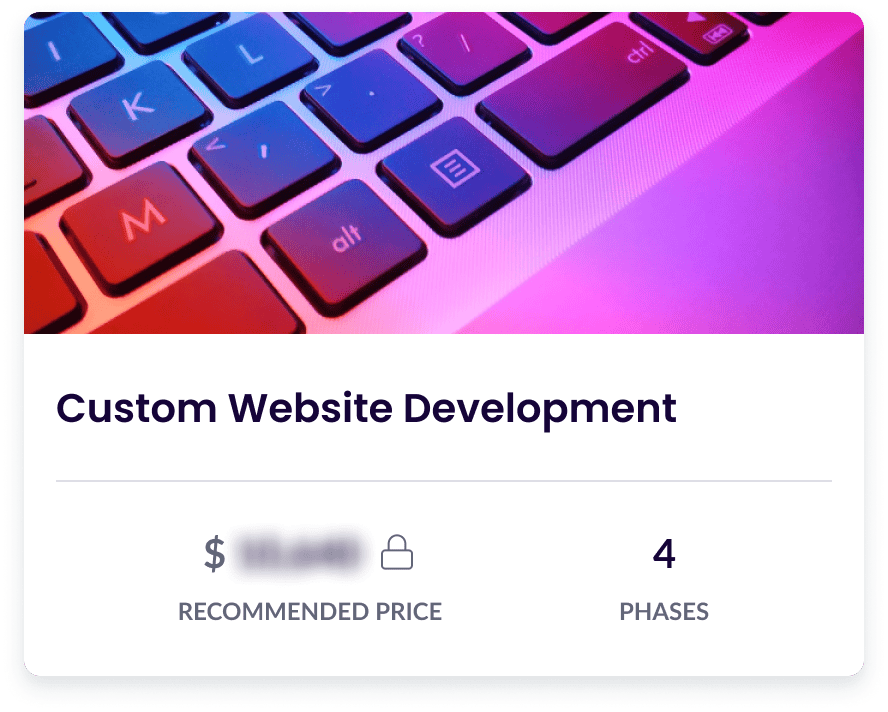Mobile Game Development Proposal Template
Pitch your next mobile game development project with confidence with this fully customizable scope of work template that includes project phases, detailed services, and recommended pricing, so you can get to “yes” more quickly.
Mobile Game Development Scope of Work
In the rapidly evolving world of mobile gaming, creating a captivating and immersive game requires creativity, strategic planning, technical prowess, and a clear vision. For freelancers, creative studios, and agencies tasked with bringing these digital adventures to life, the journey from concept to launch is filled with critical decisions on gameplay mechanics, design aesthetics, platform optimization, and user engagement strategies.
A well-defined scope of work is essential for navigating this complex process, ensuring clear communication, meeting milestones, and delivering a game that resonates with its intended audience. Whether you're crafting a casual mobile game to brighten daily commutes or developing an intricate world that gamers can dive into, starting with a comprehensive mobile game development scope of work template can set the foundation for a smooth development process, align expectations, and pave the way for the next gaming sensation.
Our Mobile Game Development scope of work template outlines three project phases, from conceptualization to testing and deployment, providing a comprehensive breakdown of services within each phase. This scope template also includes pricing recommendations based on crowdsourced pricing data from a vast network of over 100,000 freelancers.
The Mobile Game Development scope of work template is also completely customizable and editable—there are no locked PDFs or documents to download offline. Just start editing and customizing your scope of work to meet your project needs, then seamlessly send it to your client for approval and signature. It really is that easy.
Included in this scope template:
✓ Recommended overall price for the project based on crowdsourced data from over 100,000 freelancers.
✓ Detailed breakdown of 3 phases and services to include in the project.
✓ Edit and customize as needed to fit your project and client needs.
✓ Turn a scope into a proposal for client sign off in just a few clicks.
Frequently Asked Questions
-
Mobile Game Development is the comprehensive process of creating, designing, testing, and releasing a video game for mobile platforms such as smartphones and tablets. This intricate process combines art, storytelling, programming, and game design to craft engaging, interactive experiences suited for the mobile environment. It involves various stages, including conceptualization, storyboard creation, coding, graphic design, sound design, testing, and deployment. With the rising popularity of mobile gaming among diverse audiences globally, the scope for creativity and innovation in this field is vast.
Interested in venturing into the mobile gaming realm or enhancing your game development services? Explore our Mobile Game Development Scope of Work Template. It's designed to guide you through defining your services, ensuring a clear, structured approach to your game development projects. Dive in today and take the first step towards creating captivating mobile gaming experiences.
-
The timeline for completing a Mobile Game Development project varies widely depending on the complexity of the game, the size of the development team, and the project’s scope. Simple games can take anywhere from a few months to a year, while more complex games with intricate designs and mechanics may take several years to develop fully. Timelines should be flexible to accommodate revisions and unexpected challenges.
-
Pricing for Mobile Game Development projects can vary significantly based on the game's complexity, the required skill set, the timeframe for completion, and the project's specific needs. Freelancers and agencies may charge anywhere from a few thousand dollars for simple games to over a hundred thousand dollars for more elaborate, high-production-value games. Factors such as multiplayer features, platform diversity (iOS, Android, etc.), and the need for server-side technologies can also affect the cost.
It's crucial to account for all aspects of the development process, including design, programming, testing, and post-launch support, when determining your pricing structure.
Our Mobile Game Development scope of work template includes recommended prices backed by crowdsourced pricing data we collected from over 100,000 freelancers. Our prices are are kept up to date to ensure freshness and accuracy. This insight helps ensure your pricing reflects the valuable expertise you bring to the table.
-
Creating a Mobile Game Development scope of work involves outlining the project's objectives, deliverables, timelines, and specific tasks in detail. Start by understanding the client’s vision, target audience, and desired game features. Define the game’s genre, platform(s), design specifications, development tools, and technologies to be used. Include milestones, testing phases, and revision policies. Clearly specify the responsibilities of both the client and development team, and detail the payment schedule. Incorporating these elements will help manage expectations and ensure a clear, actionable roadmap for the project.
After you’ve checked out our Mobile Game Development scope of work template, edit the phases, services, and prices however your project requires. Once all looks good, save that scope of work to your library by creating your free Wethos account. Once you’ve created a scope, you can go on and add contract terms, send proposals for client signature, create an invoice, and get paid! 🤑
-
When presenting your game idea, ensure you have non-disclosure agreements (NDAs) signed by all parties involved to protect your intellectual property. Also, register your game concept, design, and name as appropriate to legally safeguard your idea.
-
Best practices include conducting both alpha and beta testing phases, utilizing a mix of automated and manual testing methods, focusing on different device types and operating systems, and gathering feedback from a diverse group of test users. These steps help identify and rectify technical issues, gameplay balance, and user experience problems.






